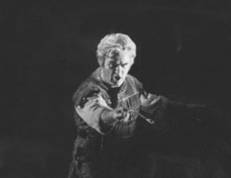Jon Vickers
I would like to thank Imogen Norcroft for the recording (Winterstürme wichen dem Wonnemond 2, 3 and 4). I would like to thank Thomas Silverbörg for the recordings (Parsifal, Fidelio). I wish to thank Thomas Silverbörg for the picture.
Back in the 1960's, I first heard from Jon Vickers through French and English (Rosenthal) reviews. While English reviews were all unanimous in their praise, the French critics of that time were pretty negative, complaining about his lack of top notes, his abuse of pianissimi in difficult passages and so on. Soon after, I acquired the Walküre version with him and conducted by Leinsdorf. On record and in a low tenor role, Vickers sounded pretty good. Having admired the Samson et Dalila recording with Luccioni, I purchased the version with Vickers after reading the excellent English reviews. I put it on and started listening to Arrêtez ô mes frères. Remembering the Luccioni, Verdière, Escalaïs etc renderings, I was stunned by the lack of power and the insignificance of Vickers's presence and singing. After sampling more of his singing, I never played the set again. Even the miracle of modern electronics could not save that mediocre performance. After spending a lot of money to get a ticket, I went to hear Vickers in Carmen during the Salzburg summer festival. I heard, or rather barely heard, a non-heroic voice, necessary in the last two acts, going through the part with overuse of pianissimi. As usual there was praise from the English, condemnation from the French. During the following years, I heard him in different roles, especially Canio and Otello, not at all the voice for these roles. He was particularly ridiculous in Otello, where he overacted faute de mieux, wiggling his rear-end while crawling on the stage. The only time I was satisfied with him was in Peter Grimes, an opera I went to hear because it was part of my subscription. Since I could not care less for Britten's operas, I never repeated the experience. Now French critics have also lowered their standards, Segalini finds him the greatest heroic tenor!? But this is the same person that found that Ninon Vallin was singing like a fishmonger.
Born Jonathan Stewart, he wanted to study medicine, but failed to get a place at university, so he worked as a department store manager, and sang as an amateur in church and in operetta in Winnipeg. After studying voice at the Toronto conservatory, he started as a concert tenor in 1951, followed by his operatic debut as Duca in 1954 in Toronto, where he stayed for two years. In 1957, he made a successful debut at Covent Garden as Riccardo; he would sing at Covent Garden regularly until 1969 (Don Carlo, Radames, Florestan, Samson, Énée, Siegmund, Tristan...). The school for fathers (Filipeto) – Toronto, radio, 26 November 1952 The rake's progress (Sellem) – Toronto, radio, 22 April 1953 Così fan tutte (Ferrando) – Toronto, radio, 25 November 1953 Rigoletto – Toronto, Opera Festival, 25 February 1954 A tale of two cities (Charles Darnay) – Toronto, radio, 5 May 1954 Die Fledermaus (Alfred) – Toronto, TV, 16 May 1954 Down in the valley (Brack Weaver) – Toronto, TV, 1 August 1954 Evgenij Onegin – Toronto, radio, 17 November 1954 Manon Lescaut (act 2) – Toronto, TV, 30 December 1954 La traviata – Toronto, Opera Festival, 1 March 1955 Tosca (act 1) – Toronto, TV, 26 May 1955 Pagliacci – Montréal, TV, 3 November 1955 The ruby (Albert) – Toronto, radio, 30 November 1955 Il trovatore (act 4) – Toronto, TV, 5 January 1956 Le nozze di Figaro (Basilio) – Toronto, TV, 22 January 1956 Die Walküre (act 1) – Toronto, radio, 6 February 1956 Carmen – Toronto, Opera Festival, 24 February 1956 The rape of Lucretia (Male Chorus) – Stratford, Festival, 7 July 1956 The yeoman of the guard – Toronto, radio, 5 September 1956 Troilus and Cressida (Troilus) – Toronto, radio, 10 October 1956 H.M.S. Pinafore (Ralph Rackstraw) – Toronto, TV, 31 October 1956 Médée – Philadelphia, American Opera Society, 17 November 1956 Fidelio (Florestan) – New York, American Opera Festival, 20 November 1956 Gianni Schicchi (Rinuccio) – Toronto, TV, 26 December 1956 Un ballo in maschera – Cardiff, Royal, 4 March 1957 Les Troyens – London, Covent Garden, 14 June 1957 Aida – London, Covent Garden, 26 November 1957 Don Carlos – London, Covent Garden, 9 May 1958 Die Walküre – Bayreuth, Festspielhaus, 14 August 1958 Samson – Leeds, Royal, 14 October 1958 Parsifal – London, Covent Garden, 28 May 1959 Andrea Chénier – Wien, Staatsoper, 13 January 1961 Otello – Buenos Aires, Colón, 17 May 1963 Samson et Dalila – Buenos Aires, Colón, 28 June 1963 Lady Macbeth Mtsenskogo uezda (Sergej) – San Francisco, War Memorial, 23 October 1964 Der fliegende Holländer (Erik) – New York, Met, 1 March 1965 Pikovaja dama – New York, Met, 28 September 1965 Peter Grimes – New York, Met, 20 January 1967 Padmâvatí (Ratan-Sen) – Buenos Aires, Colón, 23 July 1968 Tristan und Isolde – Buenos Aires, Colón, 25 September 1971 Dido and Aeneas – Dallas, Opera, 3 November 1972 Salome (Herodes) – Orange, 13 July 1974 Norma – Orange, 20 July 1974 Její pastorkyňa (Laca) – New York, Met, 15 November 1974 La forza del destino – New York, Met, 17 January 1975 The diary of one who vanished – Guelph, Spring Festival, 27 April 1975 Benvenuto Cellini – Boston, Opera, 3 May 1975 L'incorazione di Poppea (Nero) – Paris, Opéra, 17 March 1978 Prodaná nevěsta (Vašek) – New York, Met, 25 October 1978 Reference: Jeannie Williams A hero's life. Jon Vickers, Northeastern University Press, Boston, 1999 |
